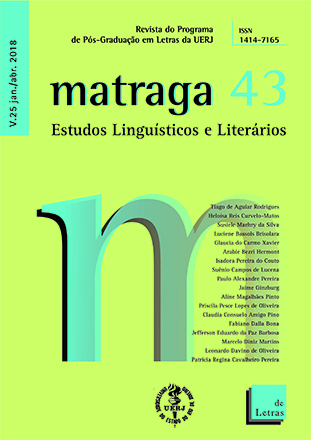Ensino do português para falantes de outras línguas: análise das transferências dos padrões da LM na escrita
DOI:
https://doi.org/10.12957/matraga.2018.32419Palavras-chave:
Aquisição de língua, imigrante, aspecto fô¬nico, aspecto morfossintático, escrita.Resumo
Este estudo versa sobre a aquisição do português brasileiro por falantes de outras línguas, mais precisamente no que se refere à escrita. A proposta foi investigar como esses falantes desenvolvem o sistema escrito na língua não nativa, observando possíveis influências dos padrões de suas línguas nativas, mais precisamente no que se refere aos aspectos fonético-fonológicos e morfossintáticos. O estudo foi desenvolvido a partir de uma amostra de produções escritas coletadas com imigrantes, sendo estes domiciliados nas cidades de Rio Grande – RS e Pato Branco – PR. Ao todo foram incluídos na amostra 17 informantes, sendo sete falantes nativos do crioulo haitiano e 10 falantes nativos do espanhol. A análise revelou que, com relação aos aspectos fonético/fonológicos, tanto os haitianos quanto os hispânicos apresentam na produção escrita alterações relativas ao fonema e ao acento e, considerando os aspectos morfossintáticos, as alterações evidenciadas dizem respeito à concordância nominal e verbal, regência preposicional, bem como questões de mudança de gênero gramatical.
Downloads
Downloads
Publicado
Como Citar
Edição
Seção
Licença
AUTORIZAÇÃO
A Matraga – Revista do Programa de Pós-Graduação em Letras da UERJ está autorizada a publicar o artigo ora submetido, caso seja aceito para publicação online. Fica atestado que a contribuição é original, que não está sendo submetida a outro editor para publicação, e que a presente declaração é a expressão da verdade.
Os trabalhos publicados no espaço virtual da Matraga – Revista do Programa de Pós-Graduação em Letras da UERJ serão automaticamente cedidos, ficando os seus direitos autorais reservados à Matraga. Sua reprodução, total ou parcial, é condicionada à citação dos autores e dos dados da publicação.

A Matraga utiliza uma Licença Creative Commons - Atribuição-NãoComercial 4.0 Internacional.





